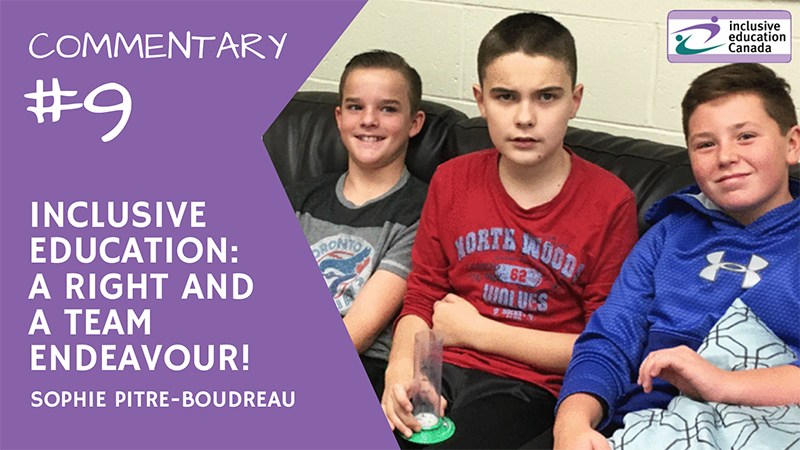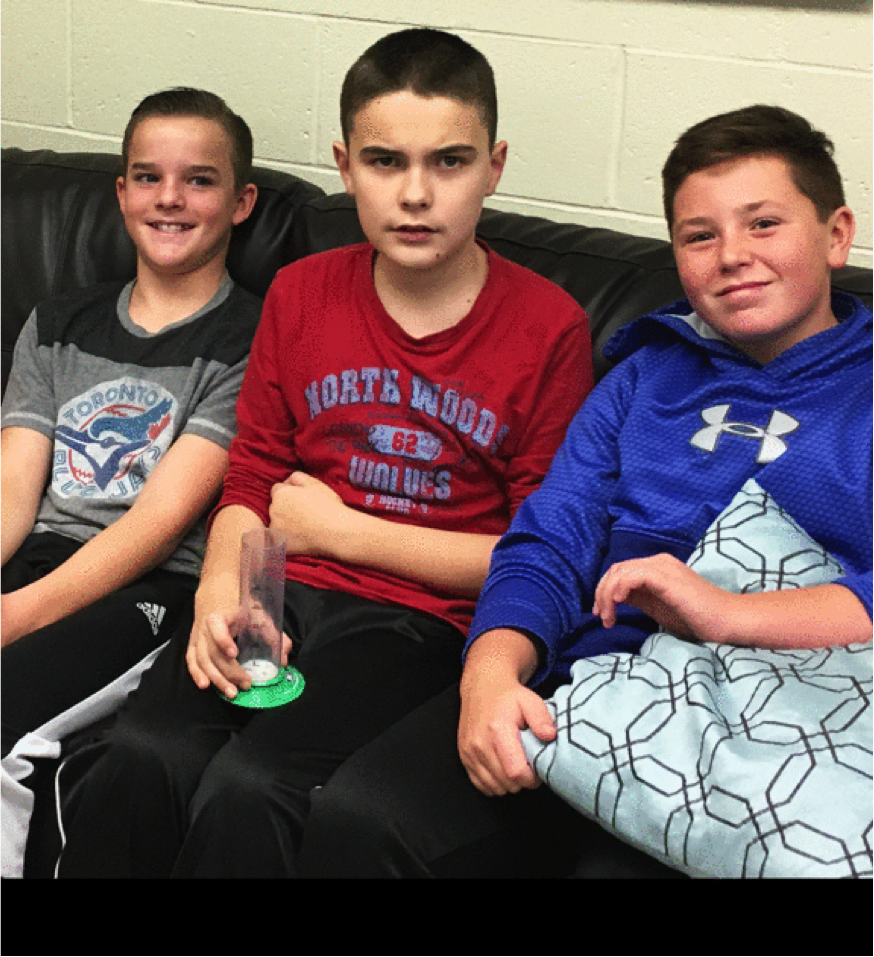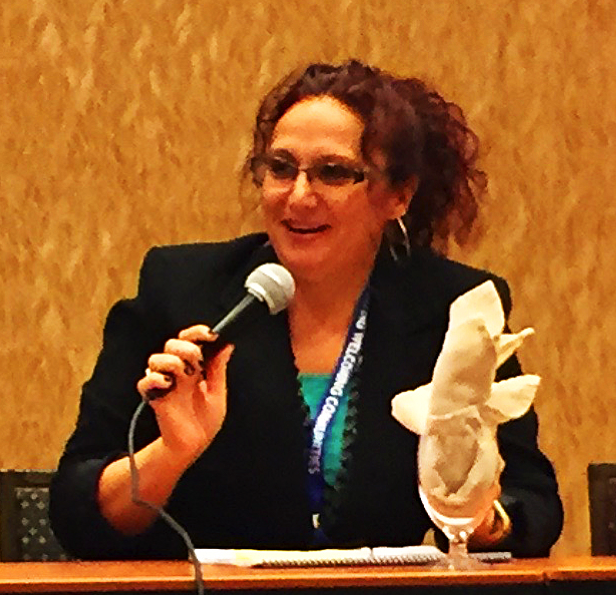 National Inclusive Education Month Commentary #9
National Inclusive Education Month Commentary #9
By Sophie Pitre-Boudreau, Grade 7 French Teacher & Vice Principal at École communautaire Le Domaine Étudiant in Petit-Rocher, New-Brunswick, Canada
Last month, we had a poetry night for the parents of our Grade 7 students and invited the community. I assure you that there were not many dry eyes in the room when Gaétan got up to get his three tokens (his reward) from the lectern, then he began to recite his poem in front of the crowd, one hand plugging his ear and the other holding his microphone as if it was a most precious jewel. His poem was:

Since entering kindergarten, Gaétan has always followed his age group. An exceptional educational assistant works closely with him, he goes to class with all his friends, he likes tickling and hugs. When he’s angry, he screams. He shouts very loudly. When he begins to scream, adults around him, who do not know him, usually rush to see who is hurt, trying to find out how to soothe him so as not to disturb the school, so as not to disturb the students. Ironically, when he entered my Grade 7 class in September, I was the one taken aback by his first episode of frustration. His screams, which lasted nearly 20 minutes, first unnerved me. I looked out at my students who were just getting to know me. I always thought of myself as having solid discipline and I always demand the best of every student. Would they start to think that I had lost control of my classroom already, the first week of September?
 By observing the students one by one, trying to remember each of their diagnoses: attention deficit disorder with hyperactivity, hearing impairment, dyslexia, dysorthographia, opposition disorder, unspecified learning disability, etc., I was speechless to observe that they were continuing their work. How was this possible? They were completely ignoring the behavior, all but three of them. These three students, who came from a nearby school, had not had the privilege of having, throughout their seven years of education, students with severe autism in the classroom. It was by observing these new students and their reactions a little more closely that I found, again, how inclusive schooling was beneficial in the short and long term for all students. At the end of the class, I wanted to address this with these three students, but one of them said: “It’s OK, Alex talked to us”. Alex is the athlete of my class, my leader, my solid. He took it upon himself to talk to them while they were working in a group. What had been said? I do not know, but one thing is certain, a message delivered by a friend is always better received than one transmitted by the teacher. Following Alex’s intervention, day after day, week after week, the newcomers adapted to the routine, to Gaétan’s outbursts in the classroom and to his mimics, sometimes ignoring him, sometimes laughing heartily with him.
By observing the students one by one, trying to remember each of their diagnoses: attention deficit disorder with hyperactivity, hearing impairment, dyslexia, dysorthographia, opposition disorder, unspecified learning disability, etc., I was speechless to observe that they were continuing their work. How was this possible? They were completely ignoring the behavior, all but three of them. These three students, who came from a nearby school, had not had the privilege of having, throughout their seven years of education, students with severe autism in the classroom. It was by observing these new students and their reactions a little more closely that I found, again, how inclusive schooling was beneficial in the short and long term for all students. At the end of the class, I wanted to address this with these three students, but one of them said: “It’s OK, Alex talked to us”. Alex is the athlete of my class, my leader, my solid. He took it upon himself to talk to them while they were working in a group. What had been said? I do not know, but one thing is certain, a message delivered by a friend is always better received than one transmitted by the teacher. Following Alex’s intervention, day after day, week after week, the newcomers adapted to the routine, to Gaétan’s outbursts in the classroom and to his mimics, sometimes ignoring him, sometimes laughing heartily with him.
At our school, teamwork and inquiry are part of our daily lives. There will always be questions, always concerns to address and barriers to break, but our team likes challenges. Some of us have qualifications either in autism or in resource teaching while others have evolved through a variety of experiences in various schools, but all have one thing in common: the desire and the belief that each child has the right to quality learning and the right to be with friends. Just like raising a child, things are not always easy but giving up on any child is not an option! During a training session several years ago, a woman said, “If you were planning a family trip, would you leave without one of your children? Then when you’re planning your teaching, you must plan for all of your students.”

We question ourselves; we challenge our ideas on a regular basis. We have noticed over the years that everyone has something to contribute. Although it may appear easier to wait until a specialist arrives to help us, the majority of the time, the solutions come from within our team, in collaboration with the parents. We know the child best and we understand our realities, know our limits and believe in our possibilities. We ask ourselves, “What do we have here to support Gaétan in the classroom, to support the teacher in meeting the academic needs for him in an inclusive setting? What is missing so that he can interact a little more with his friends in the classroom?” Each child is very different, and each one needs an individual plan to grow, to move ahead: It is a lot of work, but not doing so is not an option.
We review the plans that work less, we celebrate the successes students are experiencing and we take advantage of as many opportunities as possible to involve every student in the classroom. This often requires spontaneity on the part of students, educational assistants and teachers. For example, when working with poems, you can read a nursery rhyme that the child particularly likes. Thus, in French, we work on oral expression with the students and we take the opportunity to work on the speech, tone and cadence.
There are isolated cases in each community. We must work together to find solutions in a timely manner by trusting the expertise of our teachers and assistants, by supporting them, allowing them opportunities for continuous professional development. In such, we avoid putting Band-Aids on the challenges and we move forward for all students: education for all is not a challenge, it is our job!
In a world of learning, we cannot afford to continually question: “What happens if ….” This kind of reaction only limits the potential of our children. If one asks, “What happens if he falls?” Then our children will never learn to walk. On the contrary, if we stop and wonder: “What would have happened if we had not handed the microphone to Gaétan with his three tokens? Then we would never have witnessed that he was able to stand up in front of a crowd of 150 people and steal the show during a poetry recital that everyone will remember forever.
 Sophie Pitre-Boudreau is a Grade 7 French teacher and Vice Principal at École communautaire Le Domaine Étudiant in Petit-Rocher, New-Brunswick, Canada. She previously served as a consultant on inlcusive eductaion for Francophone school districts in New Brunswick.
Sophie Pitre-Boudreau is a Grade 7 French teacher and Vice Principal at École communautaire Le Domaine Étudiant in Petit-Rocher, New-Brunswick, Canada. She previously served as a consultant on inlcusive eductaion for Francophone school districts in New Brunswick.
